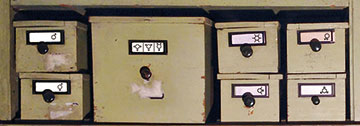AG Visual Culture

Mitglieder:
Nana Adusei-Poku, Lukas Engelmann, Marietta Kesting, Katrin Köppert, Julia Schön, Todd Sekuler
Zeitraum: Januar 2010 - Oktober 2013
Arbeitsbereiche und Fragestellungen
Die AG Visual Cultures fragt nach der Herstellung und Repräsentation von Geschlecht und 'Rasse' und nach der Möglichkeit ihrer Subversionen im Bereich des Visuellen. Sie bezieht dabei eine Vielzahl an Gegenständen visueller Kultur (Filme, Photographien, Porträts, wissenschaftliche Atlanten, Fahndungsplakate etc.) vom 18. Jahrhundert bis heute ein. Wir diskutieren nicht nur 'klassische' Texte der feministischen Filmtheorie (z.B. de Lauretis 1987), sondern vertiefen auch Fragestellungen der Visual Culture Studies (z.B. Williams 2002, Fusco 2005, Rogoff 2000). Darüber hinaus werden Ansätze aus der Philosophie aufgegriffen und debattiert, wie z.B. die Frage einer Ästhetik der Relation und die Unabhängigkeit der Betrachtenden (z.B. Rancière 2009). Zugleich soll der Umgang mit 'gewaltvollen' Bildern in der akademischen Praxis kritisch hinterfragt werden (Dazu veranstalteten wir etwa ein Arbeitstreffen mit Prof. Dr. Linda Hentschel.) Da die AG besonderes Gewicht auf das gemeinsame Filmschauen legt, auch um die Praxis des gemeinsamen 'Sehens' in die Analyse mit einzubeziehen, haben wir vor, Filmreihen zu kuratieren.
Veranstaltungen
Filmvorführung:
"Birth of a Nation" von D. W. Griffith mit einem Kommentar von Prof. Dr. Linda Hentschel (Kunsthochschule Weißensee)
Zeit: 26.05.2010
Lecture Series "Talking Eyes"
"Talking Eyes" references Irit Rogoff's notion of the "curious eye" as distinct from the "eye of connoisseurship". In response to the continued discursive distinction between "high" and "low" art (Rogoff 2002), this series seeks to encourage the use of "curious eyes" by providing a platform to foreground marginalised discourses.
Six evening lectures will enter the visual realm, zooming in on the subject about whom is typically discussed. These figures are beheld via an embodied gaze, introducing questions about pornotopic, forensic, clinical and military detection; surveillance and disease control; and sexuality, crime and war. "Talking eyes" that manifest themselves in the body evoke a desire to unite image and language and open a space to engage more closely with affective dimensions of images and their production. Discussions on the strategies and limitations of representational practices and interventions will be synchronised and positioned next to technological aspects of image production. The "Talking Eyes" lecture series, to be held at various venues throughout Berlin, will hopefully intrude and break up and thereby re-animate old and new debates in visual culture, as well as inspire exciting and relevant research.
Zeit: Sommersemester 2012
Further information:
www.talking-eyes.de
Talking Eyes on Facebook
